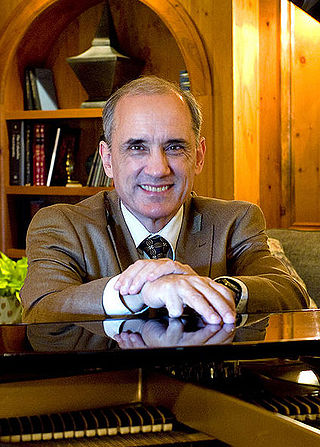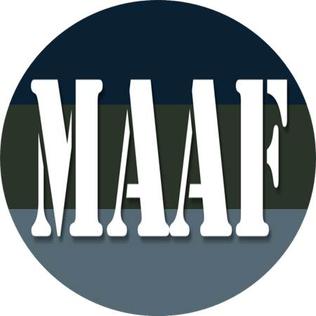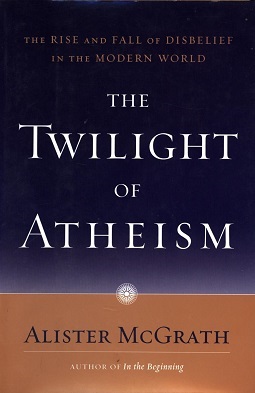Related Research Articles

Secular humanism is a philosophy, belief system, or life stance that embraces human reason, logic, secular ethics, and philosophical naturalism, while specifically rejecting religious dogma, supernaturalism, and superstition as the basis of morality and decision-making.

Freethought is an epistemological viewpoint which holds that beliefs should not be formed on the basis of authority, tradition, revelation, or dogma, and should instead be reached by other methods such as logic, reason, and empirical observation.
The opium of the people or opium of the masses is a dictum used in reference to religion, derived from a frequently paraphrased partial statement of German revolutionary and critic of political economy Karl Marx: "Religion is the opium of the people." In context, the statement is part of Marx's analysis that religion's role is as a metaphysical balm for the real suffering in the universe and in society.

The Freedom From Religion Foundation (FFRF) is an American nonprofit organization that advocates for atheists, agnostics, and nontheists. Formed in 1976, FFRF promotes the separation of church and state, and challenges the legitimacy of many federal and state programs that are faith-based. It supports groups such as nonreligious students and clergy who want to leave their faith.

American Atheists is a non-profit organization in the United States dedicated to defending the civil liberties of atheists and advocating complete separation of church and state. It provides speakers for colleges, universities, clubs, and the news media. It also publishes books and American Atheist Magazine.

The Secular Coalition for America is an advocacy group located in Washington D.C. It describes itself as "protecting the equal rights of nonreligious Americans."
Atheism is the rejection of an assertion that a deity exists. In a narrower sense, hard atheism is specifically the position that there are no deities, effectively taking the stance of a positive claim in regards to the existence of any goddess or god. The English term 'atheist' was used at least as early as the sixteenth century and atheistic ideas and their influence have a longer history.

Russell's teapot is an analogy, formulated by the philosopher Bertrand Russell (1872–1970), to illustrate that the philosophic burden of proof lies upon a person making empirically unfalsifiable claims, as opposed to shifting the burden of disproof to others.

Daniel Edwin Barker is an American atheist activist and musician who served as an evangelical Christian preacher and composer for 19 years but left Christianity in 1984. He and his wife Annie Laurie Gaylor are the current co-presidents of the Freedom From Religion Foundation, and he is cofounder of The Clergy Project. He has written numerous articles for Freethought Today, an American freethought newspaper. He is the author of several books including Losing Faith in Faith: From Preacher to Atheist.

The Military Association of Atheists and Freethinkers (MAAF) is a community for atheists and freethinkers in the military, both within the United States and from around the world. The MAAF can assist U.S. military members to respond to illegal and insensitive religious proselytizing on military bases. It is an independent 501(c)(3) organization building community for freethinkers and other nontheists in the military. The MAAF supports constitutional separation of church and state and First Amendment rights for all service members. It also educates and trains both the military and civilian community about atheism and Freethought in the military.

Annie Laurie Gaylor is an American atheist, secular and women's rights activist and a co-founder – and, with her husband Dan Barker, a current co-president – of the Freedom From Religion Foundation. She was also the editor of the organization's newspaper, Freethought Today until 2015. Gaylor is the author of several books, including Woe to the Women: The Bible Tells Me So, Betrayal of Trust: Clergy Abuse of Children and, as editor, Women Without Superstition: No Gods – No Masters.

The Twilight of Atheism: The Rise and Fall of Disbelief in the Modern World is a book by Christian theologian and apologist Alister McGrath which traces the perceived decline of secular thought over the last two centuries.
Atheism, in the broadest sense, is an absence of belief in the existence of deities. Less broadly, atheism is a rejection of the belief that any deities exist. In an even narrower sense, atheism is specifically the position that there are no deities. Atheism is contrasted with theism, which in its most general form is the belief that at least one deity exists.
According to sociologists as of 2022, "the proportion of atheists in the US has held steady at 3% to 4% for more than 80 years." According to the Pew Research Center in a 2014 survey, self-identified atheists make up 3.1% of the US population, even though 9% of Americans agreed with the statement "Do not believe in God" while 2% agreed with the statement "Do not know if they believe in God". Other polling by Gallup in 2022 showed that 17% of respondents replied "No" when asked "Do you believe in God?", and another from 2023 found that 12% of respondents replied they "Do not believe in" God with 14% replying they were "Not sure about" the existence of God. Regardless of question or polling service, there is evidence the number of people not believing in God is increasing.
19th-century German philosopher Karl Marx, the founder and primary theorist of Marxism, viewed religion as "the soul of soulless conditions" or the "opium of the people". According to Marx, religion in this world of exploitation is an expression of distress and at the same time it is also a protest against the real distress. In other words, religion continues to survive because of oppressive social conditions. When this oppressive and exploitative condition is destroyed, religion will become unnecessary. At the same time, Marx saw religion as a form of protest by the working classes against their poor economic conditions and their alienation. Denys Turner, a scholar of Marx and historical theology, classified Marx's views as adhering to Post-Theism, a philosophical position that regards worshipping deities as an eventually obsolete, but temporarily necessary, stage in humanity's historical spiritual development.

United States military chaplains hold positions in the armed forces of the United States and are charged with conducting religious services and providing counseling for their adherents. As of 2011, there are about 2,900 chaplains in the Army, among the active duty, reserve, and National Guard components.
William Thomas Cummings was a Maryknoll mission priest and U.S. military chaplain, recognized by Maryknoll as a martyr of the Philippines, is one of the people to whom the quotation "There are no atheists in foxholes" has been attributed. Some of the others possibly responsible for the aphorism's currency were also present at the Battle of Bataan in 1942, when Cummings might have said it.

Jason Torpy is president of the Military Association of Atheists and Freethinkers (MAAF), an advocacy group focused on non-religious service members and veterans. He is a veteran of the U.S. Army and a Humanist Celebrant who works to increase the visibility of "atheists in foxholes".
The secular movement refers to a social and political trend in the United States, beginning in the early years of the 20th century, with the founding of the American Association for the Advancement of Atheism in 1925 and the American Humanist Association in 1941, in which atheists, agnostics, secular humanists, freethinkers, and other nonreligious and nontheistic Americans have grown in both numbers and visibility. There has been a sharp increase in the number of Americans who identify as religiously unaffiliated, from under 10 percent in the 1990s to 20 percent in 2013. The trend is especially pronounced among young people, with about one in three Americans younger than 30 identifying as religiously unaffiliated, a figure that has nearly tripled since the 1990s.
References
- 1 2 3 Reese, Thomas J. (May 31, 2007). "No Atheists in Fox Holes". Washington Post Company. Archived from the original on June 8, 2009.
- 1 2 "Discussion on Linguist List". Archived from the original on 17 June 2008. Retrieved 27 June 2017.
- ↑ "I Saw the Fall of the Philippines", Carlos Peña Romulo
- ↑ Crosby, Donald F. (1994). Battlefield Chaplains: Catholic Priests in World War II. Page 26
- ↑ Page 2 of Fulton Sheen's Wartime Prayerbook
- ↑ "The Heroic Defense of the Philippines", reprinted in Reader's Digest, July 1942
- ↑ "Oops! He Did It Again! Brokaw Repeats Canard, "There Are No Atheists In Foxholes" During NBC Evening News". Flashline. American Atheists. 2003-03-12. Retrieved 2008-11-27.
- ↑ Johnson, Chip. sfgate.com; "GI turns to Islam to find God." San Francisco Chronicle. Monday, March 6, 2006. Accessed Nov-22-2009.
- ↑ "Faith, Hope, and Charity in North Carolina" . Retrieved 27 June 2017.
- ↑ Down in the drink: true stories of the Goldfish Club , Ralph Barker 1955
- ↑ McKinnon, Andrew M. (2005). "Reading 'Opium of the People': Expression, Protest and the Dialectics of Religion". Critical Sociology. 31 (1–2): 15–38. doi:10.1163/1569163053084360. hdl: 2164/3074 . S2CID 143119316.
- ↑ "Report on Chaplains." Military Association of Atheists and Freethinkers. Accessed Nov-22-2009.
- ↑ Resnicoff, Arnold E. (June 28, 2004). "On becoming our own worst enemy". The Christian Science Monitor . Retrieved 2009-11-14.
- ↑ Allen, Joshua. There Are No Atheists in Foxholes. Rhode Island Monthly. April 2007 issue.
- ↑ "Religion: Atheists & Foxholes". Time Magazine. June 18, 1945. Archived from the original on September 19, 2010.
- ↑ Frankel, Jeffrey (Spring–Summer 2007). "Responding to Crises" (PDF). Cato Journal. 27 (2). Cato Institute. Retrieved 2009-12-17.
- ↑ Paul Krugman (2008-12-17). "Other people's wit". New York Times.
- ↑ "Military Association of Atheists & Freethinkers" . Retrieved 27 June 2017.
- ↑ December 2001, Faith L. Justice Issue: 3 (2001-12-03). "Interview: James Morrow". Strange Horizons. Retrieved 2021-10-16.
{{cite web}}: CS1 maint: numeric names: authors list (link) - ↑ Seering, Lauryn. "FFRF unveils 'Atheists in Foxholes' monument at new headquarters - Freedom From Religion Foundation". ffrf.org. Retrieved 2021-10-16.